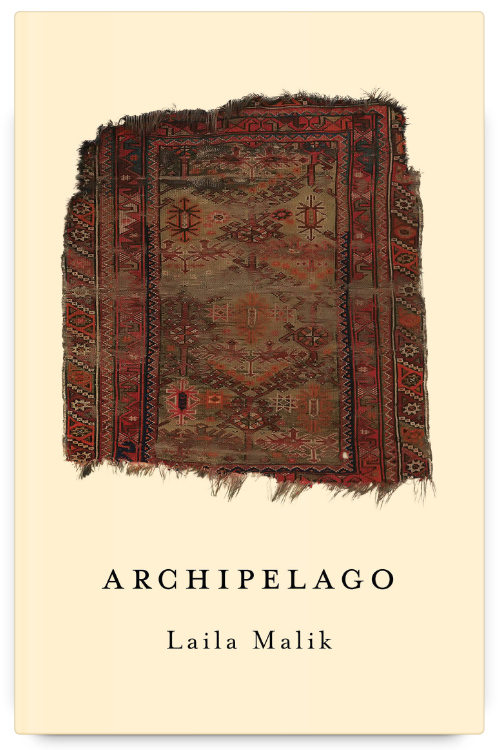From the first piece in her debut poetry collection, Archipelago (86 pages; Book*hug Press), Laila Malik ponders the complexity and impermanence of home, a concept that sometimes stretches across continents. The metaphorical loss of place through multigenerational migration and the literal loss of land through climate change are connected in each of the collection’s four sections (“precambrian”; “petroleum by-products”; “half-life of exile”; and “kufic”).
Many of the pieces in Archipelago are written in the second person, interspersed with the expanded first-person perspective “we,” transforming a collection of personal reflections into a subtle set of instructions. Malik’s poems carry the weight of unearthed treasures, ancient fragments of wisdom that researchers might devote their careers to piecing together. It is the deft juxtaposition between the “you” and the “I” and Malik’s culturally specific language that makes some poems, like “crooked elbows,” so enthralling:
what i can tell you about the motherland:
crag-tongued, even the lesser himalayas
encircled and swallowed
us whole.
we showed up faithful
in pherans and the needle direction
of long-lost brethren etched
a thousand vengeful nicks into
skin gone soft
from too much away.
The collection’s expression of home comes to embody an actual archipelago—a group of scattered islands superficially separated but connected below sea level. The speaker’s unique cluster of “islands” includes the oceans, mountains, and deserts of Canada, East Africa, Kashmir, and the Arabian Gulf. Her connection with the Gulf brings oil to the forefront of her telling of environmental degradation, as in these lines from “vanishing axes”:
we pounced seized drilled
breached carved spilled
drank all the fish in the sea
magicked water into waste.
Despite the transience the collection evokes, it calls into question the fixedness of home and reconceives the notion of roots. In “5: daughters,” the speaker, who resides in Toronto, describes living on the ancestral land of the “wendat, haudenosaunee, anishnabe, seneca” as skating “foal-legged on fresh ice.” This unsure footing appears in the collection’s last piece, “irreconciliation”:
at first she called this family, then community, then
biting a piece off her tongue and looking both ways before crossing the street
she called it nation
Archipelago is both discomforting and consoling, offering a glimpse into a life of exile and relocation that has become commonplace—and will only be more so with climate change—in our globalized world. In heart-wrenching detail, Malik’s poems show that home is where memory, culture, and land coexist and that without this unity, one must seek out ways to transform “all this breaking / into something beautiful.”

